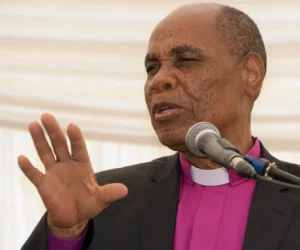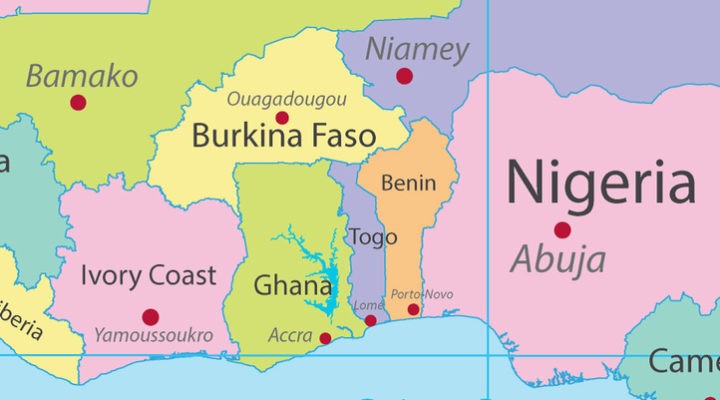United Methodist Bishop Eben K. Nhiwatiwa was safely home in Zimbabwe Aug. 27 after being detained in Nigeria on a visa complaint while visiting to set up the election of a new bishop.
The incident marks the latest encounter in an ongoing conflict in Nigeria between church leaders loyal to The United Methodist Church and factions supporting the breakaway Global Methodist Church and former Bishop John Wesley Yohanna.
Nhiwatiwa is part of a four-bishop team appointed by the UMC Council of Bishops to administer the troubled Nigeria Episcopal Area after Yohanna and his cabinet resigned in July to join the Global Methodist Church.

United Methodist Bishop Eben K. Nhiwatiwa
Multiple Nigerian and African news outlets reported variously that the bishop had been either “arrested” or “detained” by Nigerian immigration officials on a complaint that his visa document was “illegal.” One outlet, The Herald in Zimbabwe, wrote that Nhiwatiwa had been “deported” by Nigerian immigration because he had a “visit” visa as opposed to a “religious” visa.
The bishop’s assistant, Alan Gurupira, issued a statement Aug. 25 that Nhiwatiwa was safe in Nigeria while arrangements were being made for his return. Gurupira said UMC Bishop Mande Muyombo of the North Katanga Episcopal Area in the Democratic Republic of Congo and the Zimbabwean ambassador to Nigeria were involved in negotiations for Nhiwatiwa’s release.
The Herald report also said, “The church leadership fears that this incident may be the beginning of a broader crackdown, with plans reportedly under way to detain additional members and pastors involved in the contentious dispute.”
United Methodist pastor Ande I. Emmanuel of the Southern Nigeria Annual Conference gave this account in an email:
Bishop Eben Nhiwatiwa arrived in Nigeria successfully and was cleared at the airport with a visa on arrival. He entered Nigeria to commence his visit. But the Global Methodist Church breakaway faction led by John Wesley Yohanna reported him to the immigration that he came to promote homosexuality in Nigeria.
The immigration officers in Yola, the capital city of Adamawa State, which (was) the first location for his visit, invited him and interrogated him for three hours (Aug. 23) and put him under guard and this evening he was invited at their office again in Yola and was told that his attention is needed at the immigration headquarters in Abuja. They put him this evening on the plane with one immigration officer to Abuja to meet the Comptroller General in Abuja.
Bishop John Schol, also on the episcopal team for Nigeria, refuted reports that Nhiwatiwa had been “arrested” as claimed in some Nigerian news outlets. Schol also was asked by email whether this incident would prevent the UMC’s team from supervising the Nigeria UMC but the bishop had not replied by Aug. 27.
“Nhiwatiwa’s detention was the second harassment of a United Methodist bishop by Global Methodist Church supporters in Nigeria this summer.”
However, Emmanuel said Nigerian United Methodists have engaged legal services because of the incident involving Nhiwatiwa. Emmanuel wrote: “To answer the question, our lawyers have worked with the Council of Bishops to involve the American embassy on this matter. We need someone to bring this to the attention of the president of Nigeria.”
Nhiwatiwa’s detention was the second harassment of a United Methodist bishop by Global Methodist Church supporters in Nigeria this summer. Schol visited Nigeria in early July and was accosted by members of Yohanna’s cabinet during a meeting. A Facebook video showed him being physically pushed by at least one belligerent Yohanna supporter.
The conflict in the Nigeria Episcopal Area has been going on for several years. United Methodists who wished to remain in the UMC have clashed with former Bishop Yohanna and his supporters on many occasions. In at least three incidents, both clergy and laypeople were detained or arrested on various civil allegations that proved to be false.
The situation in Nigeria is particularly fraught because Nigerian society doesn’t separate church and state as in the United States. Consequently, religious leaders including Yohanna have used civil means to quell church disputes.
In an essay for United Methodist Insight, pastor Gabriel Banga Mususwa of Zambia, general secretary of the unofficial caucus United Methodist Africa Forum, alleges the breakaway Global Methodist Church and the Wesleyan Covenant Association are fomenting unrest throughout Africa by claiming the UMC has become “a gay church.” Homosexual practice is either socially taboo or illegal in many Africa countries.
The WCA’s Africa Initiative, headed by clergyman Jerry Kulah of Liberia, has been implicated by other grassroots African groups as a source of dissension both before and after the 2024 General Conference held April 23-May 3 in Charlotte, N.C. The UMC’s highest lawmaking body voted overwhelmingly to remove church bans on same-sex marriage and LGBTQ clergy and to eliminate language that declared homosexual practice “incompatible with Christian teaching.
The UMC has lost 7,600 of 30,000 local U.S. churches over the issue of LGBTQ acceptance from 2019 through 2023 in a process called “disaffiliation.” The process expired Dec. 31, 2023, and efforts to renew it failed at General Conference. Instead, delegates voted to remove the process from the UMC’s church law.


